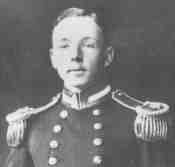
| Home | Lineage and Birth | The early years. | Conrad the Mountee. | 23rd of August 1914 | Captivity Espionage and Escapes | Augustabad | Barry Bingham VC | Conrad meets M | Conrad Assistant Military Atache. | The ffrench Connection | The Last Tigerhunt. | The Archaeology of the Reich | From Intrigue and artifice to Art. | The names Ffrench, Conrad Ffrench. | Ian Fleming | The Black Ore of Death | An Evil Medium | Off the Chessboard. | Arbutus Point. | Conrad retires to the field | The Art of Conrad O'Brien-ffrench | The Quotient of Conjecture. | News and Gossip | Bookshop & Bibliography | Mailbag | Related Links | Contact Me | |||
|
Conrad Fulke O'Brien-ffrench. Artist and Spy. |
|||
|
Barry Bingham VC sends a message
|
|||
|
|
|||
|
One day a
message arrived from
|
|||
|
|
|||
|
That
night, sixteen men went through the tunnel. Bingham and two or three others
were captured almost immediately. The rest made their way to a small wood on
the Baltic shore near One
morning, the pilot sought out Conrad. Anxiously, he enquired what had been done
with the letter Conrad had written the night before. It had been posted. The
censor, he was told, now had a fumigating box which would reveal the secret
message. Conrad would be facing a firing squad as a spy. The letter must be
retrieved at all cost. Conrad caught the censor on his way to luncheon. "Going
for lunch, Herr Censor?" "Jawohl." "Would
you care for a can of butter for your bread?" asked Conrad amiably. "Ja I
agzept mit bleasure." (DM p. 49) Conrad
knew that the food parcels were held in the censor's office. He opened the door
allowing Conrad into the room with the fumigating cupboard. There on a clip
hung the letter. As the censor retrieved Conrad's parcel, in a flash the letter
was removed. "Und
here is your box, Herr Kapitain. You have just one can of butter left." “You are
entirely welcome to it, Herr Censor," said Conrad smiling warmly, the
letter safe in his pocket. Not long
after this, the belligerents agreed that all POWs who had been three years in a
camp were to be interned in neutral countries. Conrad was sent to
|
|||


